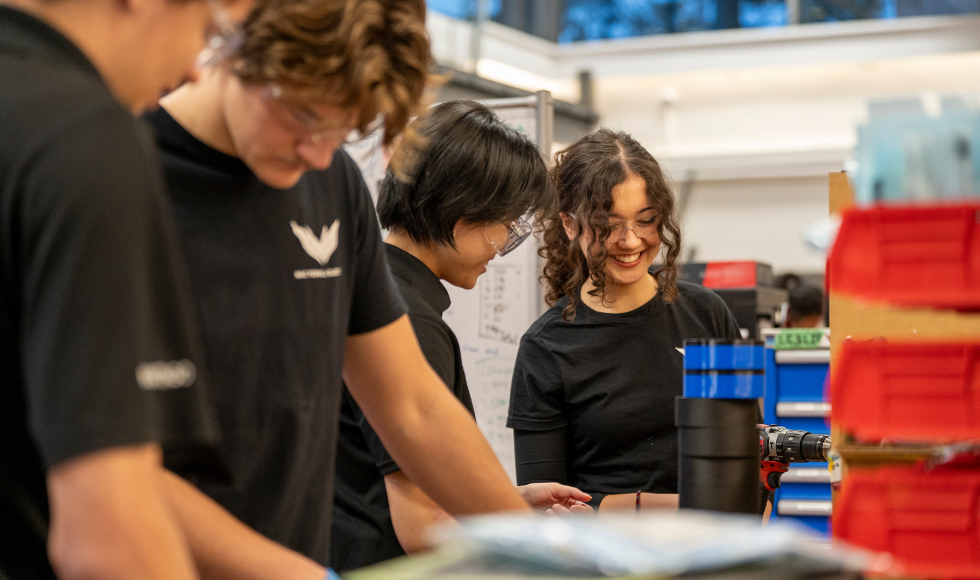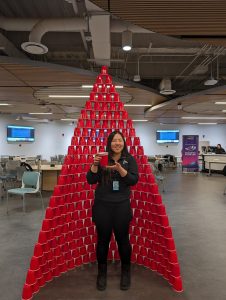Expanding horizons: The McMaster Engineering Experiential Learning and Travel Fund

Empowering women in tech
After graduating with a bachelor of health sciences degree in 2023, Ana Han made the bold decision to switch career paths and pursue computer sciences within McMaster’s Faculty of Engineering.
“I was particularly interested in neuroscience and how we could study the brain via computational techniques,” she said. “After doing a couple of summer internships at the intersection of neuroscience and computer science, I realized I was more fulfilled by the computational part of my internships.”

A participant in hack-a-thons and member of McMaster’s Artificial Intelligence Society and NEUDOSE team, Han was keenly aware of the advantages of learning outside the classroom. So, when she first heard of the 2023 Grace Hopper Celebration, a conference that strives to correct the under-representation of women in the tech field and the world’s largest gathering of 30,000+ women and non-binary technologists, she knew she wanted to be there.
“Because I had switched career paths, I didn’t have a lot of confidence in my ability to pursue computer science professionally,” she said.
“It was important for me to attend workshops that could help me network and learn more about cutting-edge technologies so that I could overcome that barrier.”
Han attended the conference in Orlando, Florida last September with the help of the McMaster Engineering Experiential Learning and Travel Fund. She says the support from McMaster alumni and the opportunity to be part of the Grace Hopper Celebration had a significant impact on her academic and professional trajectory.
“I feel more empowered as an engineer, having new skills and experiences and deepening my existing knowledge,” she said.
Driving experiential learning
The McMaster Engineering Experiential Learning and Travel Fund was Inaugurated in 2022 as a way for Faculty of Engineering reunion classes to enrich the learning experiences of the students who follow in their footsteps. The fund has already inspired generous contributions from the engineering classes of ’70-’73, ’77, ’82, ’87, ’92 and ’97 as they have celebrated milestone reunions.
Future reunion classes from the Faculty are already planning to lend their support to the fund as well. When they do, they will help unlock an expanding world of experiential learning opportunities far beyond McMaster’s local Hamilton community.
Supporting Indigenous engineers
James LeMoine, a PhD student in mechanical engineering and member of the Anishinaabe from the Mississaugas of the Credit First Nation and part of the Migizi (Eagle) clan, says the Experiential Learning and Travel Fund can be an essential tool to assist with the academic and career trajectories of Indigenous engineers.
 LeMoine is the founding president of the McMaster chapter of the American Indian Science and Engineering Society (AISES), a national nonprofit organization focused on substantially increasing the representation of Indigenous peoples of North America and the Pacific Islands in science, technology, engineering and math (STEM) studies and careers. Along with three of its members, he attended the national AISES gathering in Vancouver this spring.
LeMoine is the founding president of the McMaster chapter of the American Indian Science and Engineering Society (AISES), a national nonprofit organization focused on substantially increasing the representation of Indigenous peoples of North America and the Pacific Islands in science, technology, engineering and math (STEM) studies and careers. Along with three of its members, he attended the national AISES gathering in Vancouver this spring.
“Our chapter’s goals are to promote McMaster in the community and help with the career development of our Indigenous members,” he said. “Thanks to the experiential learning and travel fund, we were able to send four students to Vancouver for the meeting, which allowed us the rare opportunity to meet other Indigenous people in STEM (a number that is historically low).”
At the meeting, LeMoine and his colleagues heard about the many ways their culture and science collide, including stories from an elder who spoke about water and land restoration.
“It was very motivating and inspirational,” said LeMoine. “Hearing these stories made us think about the positive impact we can make in our careers as scientists and engineers.”

These kinds of outcomes are exactly what the Faculty of Engineering has been working to achieve with its many investments in building a rich, diverse and innovative experiential learning program.
“Our Faculty is rapidly approaching the point where experiential learning is infused into everything we do,” said Heather Sheardown, dean of the Faculty of Engineering. “From the Gerald Hatch Centre for Engineering Experiential Learning to courses like the Integrated Cornerstone Design Project and beyond, we are giving our students world-class, real-world experiences. The Experiential Learning and Travel Fund is an exciting new part of that and I’m grateful to the McMaster Engineering alumni who have made it possible.”
Investing in tomorrow’s innovators
Like Han and LeMoine, Jeremy Wilson, Irenaeus Wong, Kevin Mensah and Sarah Gonder from the Department of Materials Science and Engineering were supported by the fund to access a powerful learning experience, also in Orlando. Wilson, Wong, Mensah and Gonder were part of a four-student capstone project group that travelled to Florida in March to attend the International Battery Seminar & Exhibit (IBSE).
Wong described the first steps on the path that led the team to Orlando, “We created a unique engineering capstone project with the purpose of potentially starting a company with the developed product. The project was inspired from my time working as a battery cell engineering intern at Rivian Automotive, and I heard of the IBSE through my colleagues there.”

Wilson said of their experience at IBSE, “We saw it as an invaluable learning and networking opportunity to connect with global innovators in the battery space while receiving feedback on our capstone project. I personally could really feel the enthusiasm and excitement from talking with everyone: from those in industry, the researchers, to fellow students working in batteries.”
The project team left Orlando and the IBSE energized for what comes next.
“We are renewed with confidence that our project has potential to make an impact in the battery R&D space,” Wong said.
The plan now is to turn their experiential learning project into the kind of technological and entrepreneurial success that could bring them back to a future edition of the IBSE as rising stars in the battery industry.
Learn more about supporting the McMaster Engineering Experiential Learning and Travel Fund.


